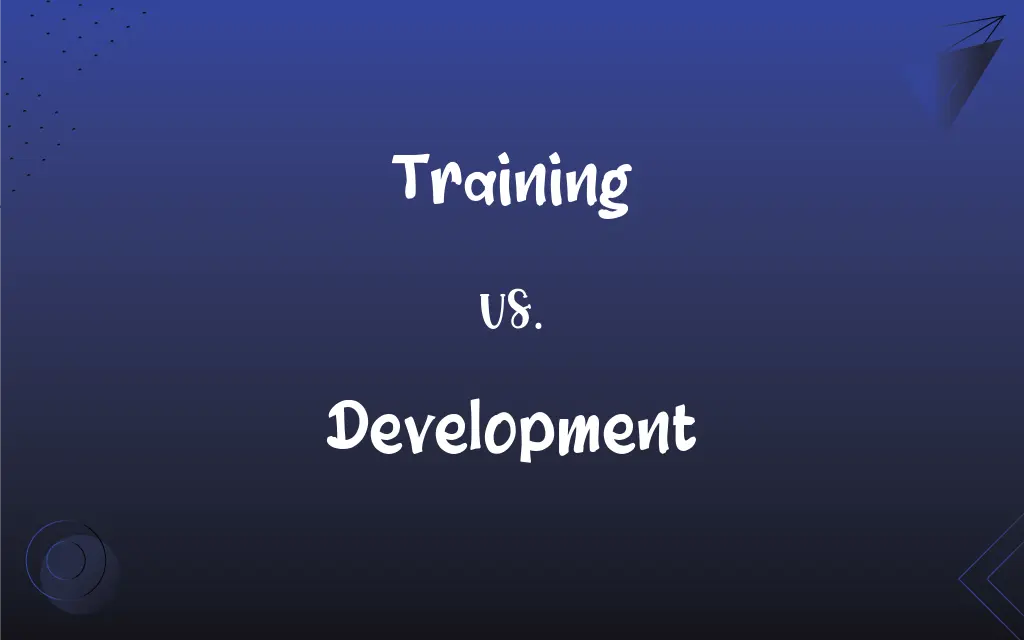Training vs. Development: What's the Difference?
Edited by Aimie Carlson || By Harlon Moss || Updated on October 26, 2023
Training refers to skill enhancement for specific tasks. Development refers to road personal or organizational growth.

Key Differences
Training is focused on acquiring specific skills or knowledge for a particular task or job. Development encompasses a broader scope, aiming for overall growth or improvement.
The objective of training is often immediate or short-term, aimed at specific competencies. Development focuses on long-term growth, potentially covering a wide range of skills.
Training often involves structured programs or courses with clear objectives. Development can include a variety of activities, not limited to formal training.
Feedback and assessment are integral to training, measuring specific skill acquisition. Development often involves ongoing evaluation and may not have specific assessment criteria.
Training is usually job-specific, tailored to improve performance in a current role. Development prepares individuals for future roles or broader responsibilities.
ADVERTISEMENT
Comparison Chart
Focus
Specific skills or knowledge
Broad personal or organizational growth
Objective
Immediate or short-term
Long-term growth
Structure
Structured programs or courses
Varied activities, not always formal
Assessment
Specific skill measurement
Ongoing evaluation, broader criteria
Application
Job-specific, current role
Future roles, broader responsibilities
ADVERTISEMENT
Training and Development Definitions
Training
Instructional program.
She's enrolled in a training program for coding.
Development
Organizational progress.
The company invests in development programs for employees.
Training
Skill enhancement.
The company offers training in customer service.
Development
Personal growth.
Her personal development includes learning new languages.
Training
Practice to improve skill.
They undergo regular training in emergency protocols.
Development
Progression of an idea.
The development of his theory took decades.
Training
Physical conditioning.
His daily training involves weightlifting and cardio.
Development
Real estate construction.
The new development includes residential and commercial spaces.
Training
Preparation for a profession.
Medical training takes several years.
Development
Evolution of a project.
The software's development took two years.
Training
The process or routine of one who trains.
Development
The application of techniques or technology to the production of new goods or services.
FAQs
Is training usually short-term or long-term?
Short-term or immediate.
Are training programs always structured?
Yes, typically structured.
What is the main focus of development?
Overall personal or organizational growth.
What is the main focus of training?
Acquiring specific skills or knowledge.
Is training job-specific?
Yes, often tailored to a current role.
How is progress measured in development?
Through ongoing evaluation.
Can training improve current job performance?
Yes, it's often the goal.
Can someone self-train?
Yes, through self-guided learning.
What is the duration focus of development?
Long-term.
Is development only for individuals?
No, it can be organizational as well.
Do companies offer training for employees?
Yes, often for specific skills.
Does development always have clear objectives?
Not always, it can be broader.
Does development have a set timeframe?
No, it can be ongoing.
Is self-development possible?
Yes, through various personal growth activities.
Can development include informal activities?
Yes, it can be varied and informal.
Does development prepare for future roles?
Yes, for future roles or responsibilities.
Can development include mentoring?
Yes, mentoring can be a part.
Is physical fitness a part of training?
Yes, in physical training contexts.
Is feedback important in training?
Yes, for specific skill assessment.
Can training be part of development?
Yes, it can be a component.
About Author
Written by
Harlon MossHarlon is a seasoned quality moderator and accomplished content writer for Difference Wiki. An alumnus of the prestigious University of California, he earned his degree in Computer Science. Leveraging his academic background, Harlon brings a meticulous and informed perspective to his work, ensuring content accuracy and excellence.
Edited by
Aimie CarlsonAimie Carlson, holding a master's degree in English literature, is a fervent English language enthusiast. She lends her writing talents to Difference Wiki, a prominent website that specializes in comparisons, offering readers insightful analyses that both captivate and inform.































































